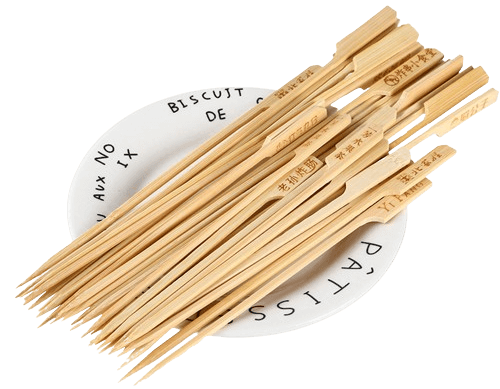Key Takeaways
| Question | Answer |
|---|---|
| Are bamboo skewers recyclable? | Generally, bamboo skewers are not recyclable due to contamination and treatment with chemicals. |
| Can bamboo skewers be composted? | Yes, bamboo skewers can be composted if they are broken into small pieces. |
| Are bamboo skewers biodegradable? | Yes, bamboo is biodegradable and can break down naturally. |
| What are the environmental benefits of bamboo? | Bamboo is renewable, grows quickly, requires less water, and needs no chemicals for cultivation. |
Introduction
Bamboo skewers are a popular choice for grilling, kebabs, and other culinary uses. At Ecostix Global, our mission is to revolutionize the way the world sees bamboo products, making them both practical and sustainable. This article explores whether bamboo skewers are recyclable, their compostability, and the best eco-friendly disposal methods.
What Are Bamboo Skewers?
Bamboo skewers are thin sticks made from bamboo, commonly used for grilling kebabs, vegetables, and fruits. They come in various sizes and thicknesses, making them versatile for different culinary applications. Bamboo skewers are cost-effective, disposable, and eco-friendly compared to metal or plastic alternatives.
Are Bamboo Skewers Recyclable?
Recycling bamboo skewers can be challenging. Generally, bamboo skewers are not recyclable due to potential contamination from food residues and treatment with chemicals to enhance durability. If bamboo skewers have been treated or exposed to chemicals, they cannot be recycled.
Alternative Disposal Methods
- Composting: Composting is a more viable option for disposing of bamboo skewers.
- Biodegradation: Bamboo skewers can biodegrade naturally, returning nutrients to the soil.
Compostability of Bamboo Skewers
Bamboo skewers are compostable, making them an excellent eco-friendly alternative to plastic skewers. Here are the steps to compost bamboo skewers:
- Home Composting:
- Break the skewers into small pieces to speed up decomposition.
- Add them to your compost heap, ensuring adequate aeration, moisture, and heat.
- Commercial Composting:
- Many commercial composting facilities accept bamboo skewers.
- Ensure the skewers are free from any non-compostable materials.
Additional Compostable Items
- Wine Corks: As long as they are made of natural cork, they can be composted.
- Fireplace Ash: Small quantities of ash from untreated wood can be added to compost.
- Natural Fiber Clothes: Clothes made from 100% natural fibers like cotton, linen, or wool can be composted if they are beyond reuse.
Biodegradability of Bamboo
Bamboo is highly biodegradable, breaking down much faster than many other materials. The biodegradation process can range from weeks to years, depending on environmental conditions and whether the bamboo has been treated.
Factors Influencing Biodegradation
- Environmental Conditions: Exposure to sunlight, rain, and soil contact accelerates biodegradation.
- Preparation: Cutting bamboo into smaller pieces can hasten the process.
Environmental Benefits of Using Bamboo Products
Bamboo offers numerous environmental benefits, making it a superior alternative to plastic:
- Renewable Resource: Bamboo grows quickly, with some species growing up to 3 feet per day.
- Low Chemical Requirements: Bamboo requires no pesticides or fertilizers, reducing chemical runoff into the environment.
- Water Efficiency: Bamboo needs less water compared to other crops, conserving precious water resources.
- Sustainability: Bamboo products are durable, reducing the need for frequent replacements.
Proper Disposal of Bamboo Skewers
To ensure the eco-friendly disposal of bamboo skewers, follow these steps:
- Preparation for Composting:
- Break skewers into small pieces.
- Ensure they are free from any non-compostable materials.
- Safety Tips:
- Avoid cross-contamination by not reusing skewers.
- Handle skewers carefully to prevent splinters.
Practical Tips for Using Bamboo Skewers
When using bamboo skewers for grilling, follow these best practices:
- Soaking Skewers: Soak bamboo skewers in water for at least 30 minutes before grilling to prevent them from burning.
- Handling Tips: Use caution when handling hot skewers to avoid burns and ensure even cooking.
By adopting these practices, you can enjoy the benefits of bamboo skewers while contributing to a more sustainable lifestyle. Explore more about bamboo products and their uses at Ecostix Global.
Comparison with Other Skewer Types
Bamboo vs. Metal Skewers
Bamboo skewers offer several advantages over metal skewers:
- Cost-Effective: Bamboo skewers are generally less expensive than metal ones.
- Eco-Friendly: Unlike metal skewers, which require significant energy to produce and can contribute to metal pollution, bamboo skewers are biodegradable and come from a renewable resource.
- Disposable: Bamboo skewers are single-use, reducing the need for cleaning and minimizing the risk of cross-contamination. Metal skewers, while reusable, require thorough cleaning to avoid rust and contamination.
Bamboo vs. Plastic Skewers
Plastic skewers are less eco-friendly than bamboo skewers for several reasons:
- Non-Biodegradable: Plastic skewers do not decompose and can contribute to long-term environmental pollution.
- Health Concerns: When exposed to high temperatures, plastic skewers can release harmful chemicals. Bamboo skewers, being natural, do not pose such risks.
Environmental Benefits of Bamboo Products
Bamboo is a sustainable and versatile resource, offering numerous environmental benefits:
- Rapid Growth: Bamboo is one of the fastest-growing plants in the world, making it a highly renewable resource. Some species can grow up to three feet in a single day.
- Low Water Usage: Bamboo requires significantly less water than many other crops, making it an excellent choice for water conservation.
- No Pesticides or Fertilizers: Bamboo grows well without the need for pesticides or fertilizers, reducing the chemical burden on the environment.
Proper Disposal of Bamboo Skewers
To ensure that bamboo skewers are disposed of in an environmentally friendly manner, consider the following methods:
- Home Composting: Break the skewers into small pieces and add them to your compost pile. Ensure proper aeration and moisture to facilitate decomposition.
- Commercial Composting: If you have access to a commercial composting facility, they can handle larger quantities and treated bamboo products.
- Reuse and Upcycling: Before disposing of bamboo skewers, consider reusing them for crafts, garden markers, or other DIY projects.
Practical Tips for Using Bamboo Skewers
Bamboo skewers are versatile tools in the kitchen and for crafts. Here are some tips for their use:
- Soaking: Soak bamboo skewers in water for at least 30 minutes before using them on the grill. This prevents them from burning.
- Safety: Handle hot skewers with care to avoid burns. Use oven mitts or tongs to move them on the grill.
- Creative Uses: Beyond grilling, bamboo skewers can be used in crafting, such as making kites, garden markers, or decorative elements.
Conclusion
Bamboo skewers are a practical and eco-friendly choice for grilling and various other uses. While they are not recyclable, they can be composted, making them an excellent option for those looking to reduce their environmental footprint. By following proper disposal methods and handling tips, you can enjoy the benefits of bamboo skewers while supporting a sustainable lifestyle.
At Ecostix Global, we are committed to providing high-quality bamboo products that align with our vision of a more sustainable world. Explore our range of bamboo skewers and other bamboo products to make eco-conscious choices in your everyday life.
For more information on how to use bamboo skewers and other sustainable practices, visit our comprehensive guides on eco-friendly bamboo skewers and prepping bamboo skewers for grilling.
FAQs
Can bamboo skewers be recycled?
Generally, bamboo skewers are not recyclable due to potential contamination and treatment with chemicals. However, they are compostable and biodegradable.
How long does it take for bamboo to biodegrade?
Bamboo can biodegrade within weeks to years, depending on environmental conditions and whether it has been cut into smaller pieces to expedite the process.
What are some other eco-friendly alternatives to bamboo skewers?
Metal skewers are a reusable alternative, although they require thorough cleaning. Avoid plastic skewers due to their environmental impact and potential health risks when exposed to high temperatures.
How can I safely dispose of bamboo skewers after use?
To dispose of bamboo skewers safely, break them into small pieces and add them to your compost pile. Alternatively, you can check with your local commercial composting facility to see if they accept bamboo products.




One Response
I was wondering if you ever thoght of changing the layout of your site?
Its very well written; I love what youve got to say. But maybe
you could a littlpe more iin thhe way of content so
people could connect with it better. Youve got an awful lot
of text for only having 1 or two images. Maybe you could space it out better? https://Lvivforum.pp.ua